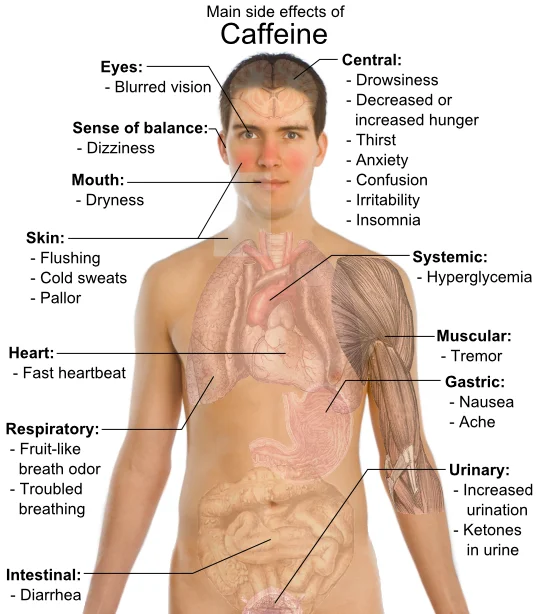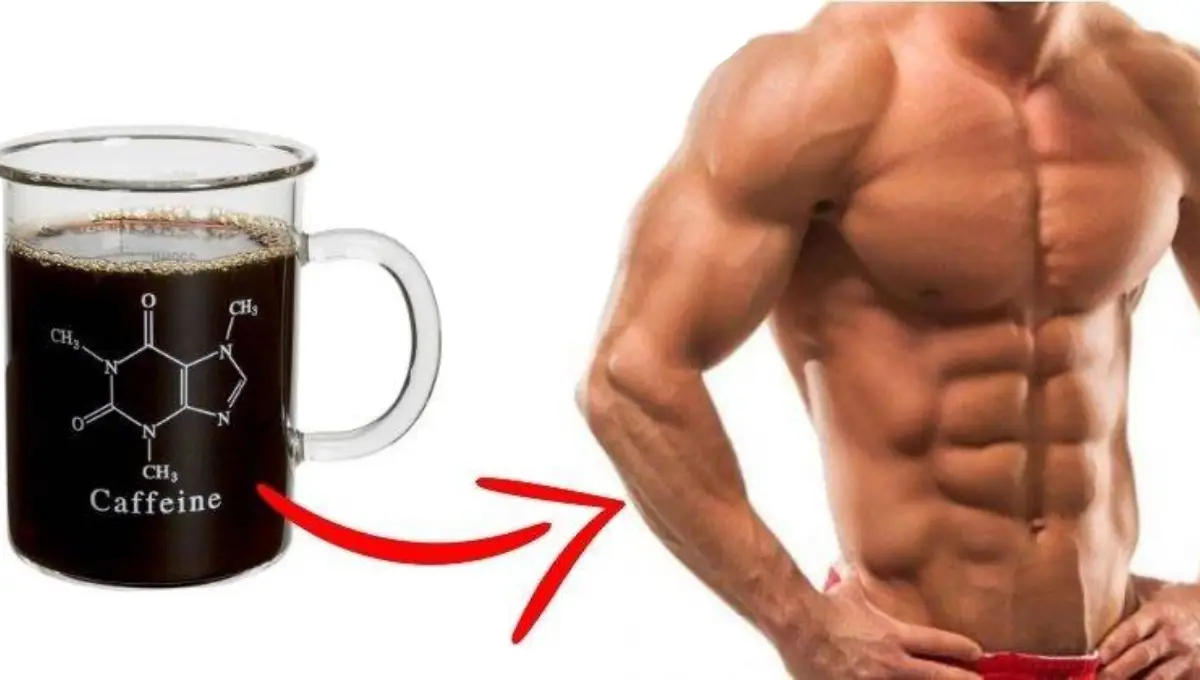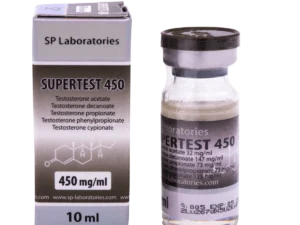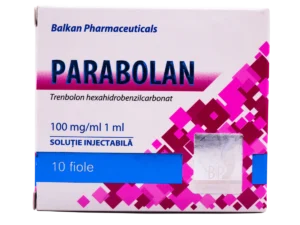Caffeine is an alkaloid, a central nervous system stimulant with a wide range of other physiological effects, belongs to the group of methylxanthines found in plants such as coffee, tea (caffeine extracted from tea, often called tein), mate (caffeine extracted from it, sometimes called matein), guarana, cola, and many others.
For pharmacological purposes, it is produced synthetically and extracted from plants. Contained in energy drinks, it is often found in sports nutrition, virtually all fat burners, and many pre-workout complexes.
Effects of Caffeine
Most studies on caffeine have focused exclusively on sports that require increased endurance. Their main conclusion is that caffeine helps most of these athletes achieve better athletic performance. There are three theories to explain this response. The first was originally thought to be the most plausible and has to do with caffeine’s ability to stimulate fat burning with energy production. Caffeine promotes the production of adrenaline, a hormone that accelerates fatty acids into the bloodstream and is a CNS stimulant. During initial exercise, muscles use the fatty acids available for energy production, keeping muscle glycogen reserves intact. Separate scientific studies have confirmed this theory.
A second theory is that caffeine can directly affect skeletal muscle by altering key enzymes or systems that regulate carbohydrate breakdown within cells. But research on this theory has been inconclusive and has not been followed through.
A third version may actually be the key to understanding how caffeine makes you feel like you’re doing less work than you actually are. According to this version, it is because caffeine, due to its direct effect on the central nervous system, can provide a psychological effect, making athletes feel like they are not working as hard, or somehow maximizing muscle contraction strength. Now we know that caffeine does not have the property to penetrate the blood-encephalic barrier and prevent the action of adenosine, a neurotransmitter that causes sleepiness by slowing down the activity of nerve cells. Caffeine is structurally similar to adenosine and can bind to adenosine receptors on brain cells. But caffeine does not have the same effect as adenosine; it does not slow down nerve cell activity. Instead, it stimulates the production of adrenaline, the hormone that makes you feel better during exercise. This is currently the prevailing theory, supported as much as possible by scientific research.
Researchers at the Institute for Scientific Information on Coffee (ISIC) concluded that drinking three to five cups of coffee a day prevents the formation of beta-amyloid plaques in the brain, which are linked to the progression of Alzheimer’s disease and dementia. Memory and cognitive function have been found to be positively affected by the two main ingredients in coffee, caffeine and polyphenols, which together help to reduce inflammation and halt the destruction of brain cells, especially in the cortical and hippocampal areas. In another study, it was noted that caffeemakers live longer.
Scientists in the United States have found that caffeine can block changes in the brain associated with cocaine addiction. However, the studies were conducted on rats, so confirmation of the positive result is required in other experimental models.
In late 2015, a study by American scientists was published in the journal Nutrigenet and Nutrigenomics about the positive effect of coffee consumption on reducing the risk of breast cancer in women with a mutation in the brca1 gene.
Staff at Stanford University School of Medicine found that caffeine, like caffeine metabolites such as theophylline in tea and theobromine in chocolate, helps avoid systemic inflammation and heart and vascular disease.
There are also studies that after physical training rugby players had testosterone 15% higher on average in the placebo group, 21% higher in the caffeine group(+/-24%).
Mechanism of action of caffeine
According to modern data, its inhibitory effect on the enzyme phosphodiesterase, which leads to intracellular accumulation of cyclic adenosine monophosphate (AMP), plays a significant role in the mechanism of action of caffeine. Cyclic AMP is regarded as a mediator substance (a secondary mediator) by means of which the physiological effects of various biogenic drugs are performed. Cyclic AMP enhances glycogenolysis and stimulates metabolic processes in various organs and tissues, including muscle and CNS. It is believed that the stimulation of gastric secretion by caffeine is also associated with an increase in cyclic AMP in the gastric mucosa.
In the neurochemical mechanism of the stimulating effect of caffeine, its ability to bind to specific (“purine” or adenosine) brain receptors, for which the endogenous ligand is the purine nucleoside adenosine, plays an important role. The structural similarity of the caffeine molecule and adenosine contributes to this. Since adenosine is seen as a factor that decreases excitation processes in the brain, its replacement with caffeine leads to a stimulating effect. With prolonged use of caffeine, new adenosine receptors can form in the brain cells and the effects of caffeine gradually diminish. At the same time when caffeine administration is stopped abruptly, adenosine occupies all available receptors, which may lead to increased inhibition with phenomena of fatigue, drowsiness, depression, etc.
Caffeine and Creatine
Contrary to popular belief, caffeine does not destroy creatine molecules, but the interaction of caffeine and creatine is still under debate. Some studies show positive results with creatine and caffeine while others show negative results and it is not clear yet who to believe. Summarizing the current scientific data, we can conclude that caffeine is indeed an antagonist of creatine, but the cumulative effect will be more positive than negative.
To explain, we can give an arithmetic example: creatine effect = 2, caffeine effect = 2. Creatine + caffeine = 3, (where caffeine effect = 2 and creatine effect = 1). Explanation: we won’t get as much of an effect as we’d expect, due to the reduced efficiency of creatine, but still the total effect will be greater.
So caffeine does decrease the efficiency of creatine, but we get more benefits from using them together than from each one separately. This is why it makes sense to buy supplements combining creatine and caffeine if the latter are tolerated well.
Caffeine in bodybuilding
Until now, it was thought that caffeine was not particularly effective if your sport is primarily about strength and endurance. But Dr. Larry Spryet and his colleagues at the University of Guelph in Ontario are ready to argue with you. They studied the effects of caffeine on athletes in strength sports. In one experiment, 14 athletes each performed three sets of exercises at maximum intensity. They rested for 6 minutes between each attempt. The first two sets lasted 2 minutes each, and the third was performed until exhaustion. Participants were tested twice: once with caffeine and once with a placebo. During the third approach, taking caffeine allowed them to work longer (4.93 minutes with caffeine versus 4.12 minutes with placebo). Caffeine unambiguously increased athletic performance in a short period of time.
The mechanisms of this phenomenon are still unclear, but the researchers were able to put forward one possible theory. By taking blood samples and biopsies of muscle tissue, they found that caffeine did not consume muscle glycogen stores as previously thought.
New cutting-edge research proves that caffeine can increase strength by stimulating the release of noradrenaline from the adrenal glands and promoting better muscle contraction. When this happens, the feeling of physical exertion is dulled, allowing you to lift more weight. In general, it seems that caffeine can gradually increase strength, which certainly leads to an increase in muscle mass. Caffeine is an effective “honest” performance enhancer. A huge number of scientific experiments show that it can improve performance by 22%. And here’s more good news: The amount of coffee needed to improve performance is about 470 ml, or 2 cups, and has no dehydrating effect.
Trained athletes perform better
Studies also show that caffeine works best as a strength booster when you are in good physical shape. Evidence for this has come from experiments with swimmers, whose sport is both anaerobic and aerobic. Perfectly trained swimmers significantly improved their speed performance after ingesting 250 mg of caffeine. The untrained non-professional swimmers could not perform well. The same group of researchers had previously conducted another experiment with untrained participants who worked on an exercise bike with moderate intensity after taking caffeine. Again, caffeine did not improve performance in the untrained participants.
Caffeine During Competition
If you want to get an extra boost of performance during competitions, give up caffeine or significantly reduce your caffeine intake a few days before the start to reduce your tolerance to it. This way, when you reintroduce caffeine back into your system, you will get a more pronounced effect. Just before you start, take 50-200 mg of caffeine from a beverage such as coffee (1-2 strong cups) or an energy/sports drink (1-2 cans).
More about caffeine
Contrary to popular belief, caffeine taken immediately before exercise does not contribute to dehydration. In a 1997 study at Ohio State University, USA, six cyclists consumed caffeinated and decaffeinated sports drinks during a 3-hour pedaling session. The researchers found no differences in performance or urine volume during exercise. Urine production increased only during rest.
In another study in which 18 healthy men consumed three different 1.75-liter drinks at rest, the caffeine-containing drink did not alter their water balance.
Researchers from the University of Maastricht, the Netherlands, found that cyclists were able to replenish fluids equally well with both water and caffeinated cola after a long workout. A 2005 study from the University of Connecticut, USA, found that both caffeine-containing and caffeine-free cola kept athletes hydrated (between workouts) for the next three training days. Athletes drank water during training sessions, but replenished their water balance with either the caffeinated or decaffeinated beverage. Further study by the same scientists confirmed that moderate caffeine consumption did not increase urine production, compared to placebo, and concluded that caffeine did not affect water-salt balance.
Caffeine for weight loss
Caffeine is very often included in fat burners to increase metabolic rate and accelerate fat burning as an energy source.
The effect of coffee and caffeine on appetite and food intake.
A 2014 Schubert MM study examined the effects of coffee, caffeine, and decaffeinated coffee in humans. Researchers found that neither coffee, caffeine, nor decaffeinated coffee affected food intake, hunger, gastric emptying rate, or glucose levels.
In an earlier study the authors also reported no effect of coffee on appetite, but a slight decrease in food intake was observed. Another study reported that decaffeinated coffee can slightly suppress hunger and increase satiety, while pure caffeine has no such effects. Presumably, this is due to the influence of other components of coffee, which increase the secretion of peptide YY.
In 2016, it was found that large doses of caffeine can increase appetite in rodents.
In summary, we can conclude that coffee and caffeine have no significant effect on appetite and food intake.
Use
A cup of coffee (237 ml) contains approximately 100 mg of caffeine. Observe what happens, and compare the results to your previous intake when you didn’t take coffee. In general, laboratory studies show that consuming doses equal to 3-6 mg per kilogram of body weight 30-60 minutes before exercise can improve both strength and endurance in well-trained athletes. However, the results obtained in the laboratory may differ from those obtained under normal gym conditions.
The best source of caffeine is black tea, which also contains other methylxanthines responsible for psychophysical activation. In one bag contains about 40-50 mg, that is, to prepare an energy drink you need to brew about 5 bags (infusion time of about 10 minutes) (tea bags are less effective than leaf tea). This should not be confused with chifir, where tea is brewed and harmful elements of the leaf are extracted.
You can also buy caffeine sodium benzoate at the drugstore. One tablet contains 40 mg of caffeine and 60 mg of sodium benzoate to improve caffeine absorption.
Also keep in mind that caffeine can aggravate certain conditions such as ulcers, heart disease, high blood pressure and anemia, not to mention more serious ones. Listen to your doctor’s recommendations. Among other things, don’t try to replace natural, sensible nutritional practices aimed at improving athletic performance with caffeine.
| Product | Caffeine content, mg/cup |
|---|---|
| Instant coffee | 60 mg |
| Espresso | 45-100 mg |
| Coffee maker/strainer | 60-120 mg |
| Black tea | 60 mg |
| Green tea | 75 mg |
| Energy drinks | 100 mg |
| Cola | 40 mg |
| Energy gel (1 sachet) | 25 mg |
| Dark chocolate (50 g) | 12 mg |
Caffeine in sports nutrition
Caffeine is used as an energy booster in sport nutrition. It has a pronounced stimulant effect that allows you to increase the intensity of exercise, which in turn leads to accelerated burning of fat reserves, and increasing the load on the muscles, thus accelerating their growth. It helps you concentrate better on your exercise technique. Caffeine is included in many fat burners, creatine with transport system, pamping complexes, energy supplements and other supplements.
Virtually every sports nutrition manufacturer makes supplements with guarana. It is in fact a long-acting caffeine supplement with a number of other stimulants. Guarana is perfectly legal and has a low cost, making it one of the most popular tonics.
Caffeine is also found in most pre-workout complexes and fat burners. The most popular ones are:
- NO-Xplode by BSN
- Jack3d (USP Labs).
- SuperPump250 by Gaspari Nutrition
- Universal – Animal Cuts
- NO Shotgun (VPX)
- SHRED-ULTRA by Millennium Sport Technologies (MST)
The best time to take caffeine supplements is 30 minutes before your workout. Almost all of the fat burners show their maximum effect when taken before training.
Recommended Doses of Caffeine
Optimal doses of caffeine depend largely on individual physiology and habituation. When caffeine-containing drinks and supplements are used systematically, the body’s tolerance increases, in which case relatively large doses of caffeine 200-400 mg are easily tolerated. Some people experience overdose symptoms as early as a 100 mg dose. Therefore, all caffeine-containing supplements should be started with a gradual increase in dose.
A systematic review of potential side effects of caffeine consumption in healthy adults, pregnant women, adolescents, and children confirmed the following recommendations: ≤400 mg/day (4 cups of coffee) for adults, ≤300 mg/day for pregnant women, and ≤2.5 mg/kg/day for children and adolescents.
Side effects of caffeine
The side effects and general effects of caffeine are clearly illustrated in the figure. Pregnant and nursing mothers should avoid taking caffeine-containing sports supplements. People over the age of 50 should take caffeine-containing sports nutrition with extreme caution. If serious side effects occur, stop taking the product.

It is widely believed that caffeine is especially dangerous for the heart because it causes it to “overload. However, studies have not clearly determined that the stimulating effect of caffeine on the heart can be regarded as a side effect. In addition, this substance dilates coronary vessels and improves the rheological properties of the blood, which may even reduce the risk of coronary heart disease, heart attack and other diseases. It should be emphasized that it is not the use of this substance that is dangerous, but abuse and overdose.
About the harm of the coffee craze
Daily consumption of caffeine sooner or later leads to exhaustion of the nervous system and a decrease in mental and physical performance. Even very healthy people are not recommended to drink caffeinated beverages more than 2 times a week. Caffeine is a strong stimulant of gastric secretion: it increases the secretion of all digestive glands and the density of gastric juice, which contributes to the development of gastritis and worsens peptic ulcer disease. Caffeine and other alkaloids of coffee sharply accelerate the movement of food through the gastrointestinal tract – as a result the food does not have time to fully digest. Processes of putrefaction and fermentation in the intestine arise. For this reason you should not wash down your food with tea or coffee. If you do drink caffeine-containing drinks, it should be taken on an empty stomach at least 1 hour before the meal, as it is the custom in many countries.
Additional Information
Caffeine is an alkaloid contained in tea leaves (about 2%), coffee seeds (1-2%), cocoa seeds, kola nuts; it can also be obtained synthetically. By structure and pharmacological properties caffeine is close to theobromine and theophylline; all three named alkaloids belong to the group of methylxanthines, but of them caffeine has the strongest stimulating effect on the CNS. Theophylline has a lesser effect, theobromine even lesser; theophylline stimulates cardiac activity and diuresis more strongly, theobromine action is less pronounced, caffeine even less. Because of these differences in potency, caffeine is used primarily as a CNS stimulant.
Caffeine increases and regulates excitation processes in the cerebral cortex; in appropriate doses it increases positive conditioned reflexes and increases motor activity. Its stimulating effect increases mental and physical performance, reduces fatigue and sleepiness. Large doses can, however, lead to exhaustion of nerve cells. The action of caffeine (as well as other psychostimulants) to a large extent depends on the type of higher nervous activity; therefore dosage of caffeine should be made taking into account individual characteristics of nervous activity. Caffeine weakens the effect of sleeping pills and narcotics, increases reflex excitability of the spinal cord, excites respiratory and vasomotor centers.
In the neurochemical mechanism of the stimulating effect of caffeine, its ability to bind to the specific (purine or adenosine) receptors of the brain, the endogenous ligand for which is the purine nucleoside adenosine, plays an important role. The structural similarity of caffeine and adenosine molecules contributes to this. Since adenosine is seen as a factor that reduces excitation in the brain, its replacement with caffeine leads to a stimulating effect. When caffeine is used for a long time, new acenosine receptors may form in brain cells, resulting in a gradual reduction of caffeine action. At the same time, when caffeine administration is suddenly stopped, adenosine binds all available receptors, which can lead to increased inhibition with the phenomena of fatigue, drowsiness, depression, etc.
The Belgian research laboratory “Nestec” has developed a new prolonged-acting caffeine drug. The prolonged action product provides a significant increase in the period of caffeine stimulation, while maintaining the caffeine concentration in the body, which does not cause adverse reactions. Studies indicate that taking 300 mg of the new formulation allows 24-48 hours without sleep. There is no significant accumulation of caffeine in tissues of the body, and the possibility of pathological effects of this drug on the cardiovascular system is excluded.







